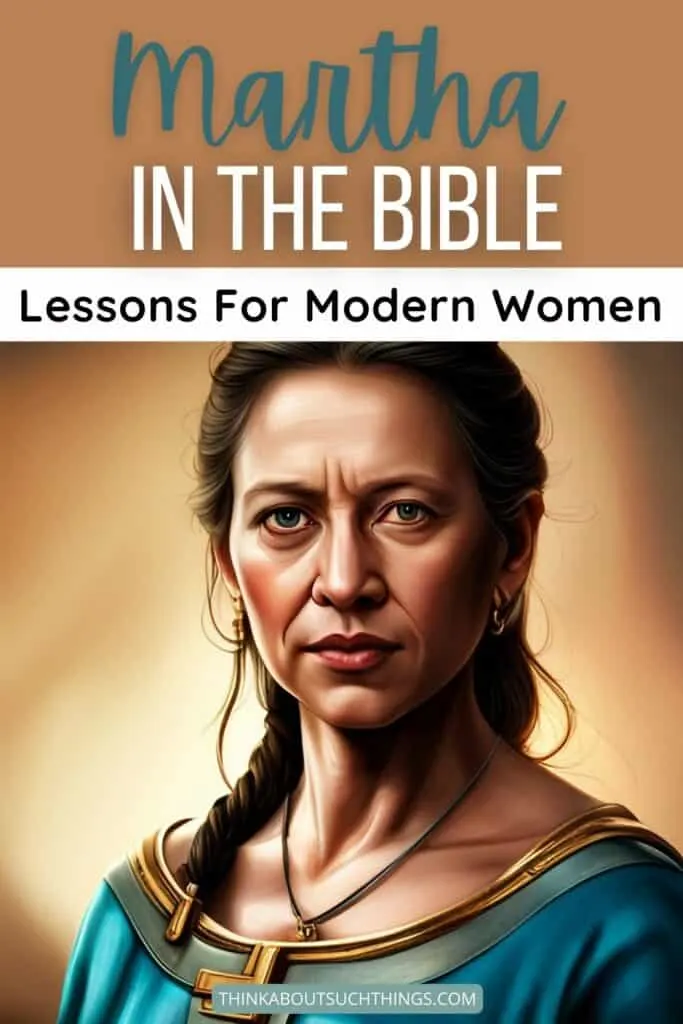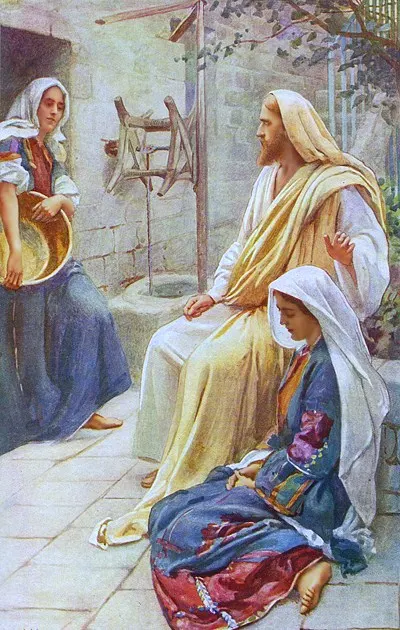In this article, we will explore Martha in the Bible! We learn vital life lessons from her and how to apply them to our lives. So, grab your Bible, and let’s dive in…
The Bible offers very little information about Jesus’ private life. We know a few things about His childhood, and we later find out that He had siblings, but the Bible focuses mainly on His ministry.
But we do find a peek into Jesus’ human side (His friends and family) when the gospels refer to three siblings: Martha, her sister Mary, and their brother Lazarus.
Martha is a remarkable person, but she’s often ignored or glossed over because of the very first time we encounter her, which is sad. There is so much more to her then that one time…
So, who was Martha according to the Bible, and what is there that modern Christians can learn from her? Let’s find out!

Martha In The Bible
I always find it fun and very interesting to look into the meaning of names. So, with Martha in the Greek, we see it to mean lady or mistress of the house.
Μάρθα Mártha, mar’-thah; probably of Chaldee origin (meaning mistress); Martha, a Christian woman:—Martha.
The first time that the Bible mentions Martha is in Luke 10:38-42. Jesus went into a village (Bethany, as we see in other verses) where Martha and her siblings lived. We see in verse 38 that Martha welcomed Jesus into her home.
Unfortunately, what happens next often makes us view Martha negatively.
Her sister, Mary, sat at Jesus’ feet and listened to Him teaching while Martha was busy being a good hostess or as her name states being the mistress of the house.
Eventually, Martha got angry and asked Jesus to tell Mary to help her, but Jesus responded that Mary had chosen the good portion and that Martha was concerned over too many things.
Most people camp here when it comes to Martha and base their conclusions of who or type of person she was.

Now, the next time we encounter Martha is described in John 11.
Lazarus had fallen ill, so Mary and Martha sent a message to Jesus. It seems as if Jesus delayed going to Bethany on purpose. But when He eventually went, Martha was the one who ran to Him to tell Him that Lazarus was dead. But her statement is striking:
.Lord, if you had been here, my brother would not have died. But even now I know that whatever you ask from God, God will give you. John 11:21-22
Notice Martha’s faith. Pretty bold!
She believed that Jesus could raise Lazarus from the dead, and in verse 27, she confesses her belief that Jesus is the Son of the living God.
She said to Him, “Yes, Lord, I believe that You are the Christ, the Son of God, who is to come into the world.”
Over the following few verses, it’s interesting to note that Mary, the same woman who sat and listened to Jesus’ teaching, was the one who ignored Jesus’ arrival and remained in the house.
This contrasts with Martha, the serving sister who rushed to meet Him and believed that Jesus could raise Lazarus.
The third time we encounter Martha, she is only mentioned briefly.
In John 12, Jesus is in Bethany and reclining at the table with Lazarus. Verse 2 simply says, “Martha served.”
It is interesting to note that she isn’t rebuked this time for serving. Perhaps there is a place, season, or time for serving, but also a time for being at the feet of Jesus. Another way to look at it is that Martha didn’t complain or despise her sister this time. Two things to think about when looking at that story…
The rest of this portion is dedicated to Mary, who broke a vessel of expensive spikenard oil and anointed Jesus’ feet.
Apparently, Martha did not suffer lack. She seems to have entertained guests quite frequently, not to mention the fact that the family had the means to afford spikenard oil, which would have cost approximately the same as a year’s wages in those days due to its scarcity.
Some scholars believe they were related to Simon the Leper, who had died and left them a sizeable inheritance.
To this day, people tend to recognize Mary for her incredible commitment, but few acknowledge Martha. And yet, the few facts we know about her are enough reason to study her example of faith further.
Lessons From Martha In The Bible
Martha teaches us a few things that we should not do but also some things we should. Let’s examine them more closely.

1. Get Your Priorities Straight
This is probably the most famous lesson people learn from Martha’s example. As she was busy around the house, being the perfect hostess, and “lazy” Mary was just sitting and listening to Jesus, Martha got angry and asked Jesus to tell Mary to go help her.
I’m sure many of us can resonate with Martha’s emotions here; few things are as frustrating as having to do everything yourself while everyone else in the household seems to be relaxing and having fun.
However, Jesus’ reaction is eye-opening: He basically told her to stop stressing, relax, and leave Mary alone because she was doing the right thing by listening to Jesus’ teaching.
We can often get so caught up in the things we have to do that we neglect God. There’s a saying that’s commonly used in pastors’ households: never be so busy with the kingdom of God that you forget the God of the kingdom.
The things we do are often important and must be done, but sometimes, it’s okay to do a little bit less and make time for our Savior.
Whatever we do, Christ must always be our priority—not doing things for Him but spending time with Him.
2. Serving Is Still Important
It’s easy to see Jesus’ reaction as an indication that we should not serve, but that’s not what Jesus meant.
On the contrary, Jesus’ entire ministry was about serving others.
Martha also proved this because, after her dramatic confirmation of faith and the miracle that brought Mary to the point where she anointed Jesus’ feet, we find Martha serving again, but without complaining.
I feel like the emphasis was needed! I know I’m guilty of complaining!
There are various levels of servanthood determined by the multiple roles that we, as Christian women, must fill. We have to serve our families, of course.
That’s part of the responsibility of marriage and parenthood. But we often serve in our jobs, ministries, and charitable or volunteer work we do.
All of these areas of servanthood are important. Serving should never be our number one priority, but it should be important enough for us to dedicate time and effort and do it without complaining.
3. Your Role Does Not Determine Your Faith
Mary and Martha had vastly different reactions when Jesus showed up after the death of Lazarus.
Mary, the woman who spent time with Jesus rather than helping her sister, did not even leave the house to meet Him. We don’t know why this was; it could have been anger because He had taken so long, or it could have been hopelessness.
We can’t judge her either way; most of us would probably have reacted similarly.
Martha, the woman who (apparently) did not spend so much time listening to Jesus’ teachings compared to her sis, was the one who rushed to Jesus and told Him that she knew Jesus could still do something about Lazarus even though he was already dead.
She followed that up with statements about the resurrection of the dead and, finally, a confession of her belief in Jesus as the Son of God.
If I had to guess which one of the sisters would make such a bold statement, I would have imagined it would be Mary, the one who clearly put in the time to learn from Jesus and spend time with Him, not the sister who was always busy with other, “less important” things. But here, we see the exact opposite to be true.
The lesson here is that we can’t judge another’s faith (or our own, for that matter) based on our roles. Many pastors’ wives are confident outwardly but struggle with their faith, while there are women working quietly in the background who have enough faith to move mountains.
4. Focus On Your Role
This ties in with point three, but from a different angle.
As we read these verses, it’s natural to compare the two sisters based on their strengths and weaknesses. We tend to do the same in our everyday lives.
Like Martha, we compare people with one another, and we also compare ourselves with them, often jumping to conclusions about whether someone is living out their calling. These comparisons can become quite judgmental.
But after Martha’s statement of faith, we see that she went straight back to serving, but this time she did not scold Mary for worshiping and anointing Jesus with expensive oil. (Judas Iscariot did that well enough, anyway.)
Martha simply carried on serving, worshiping the Lord in her own way.
That’s an important point. God knows the heart with which we do things. He knows if we serve to be seen by others or do it as an act of worship. And, if it’s a form of worship, He wants us to focus on that.
We need to stop focusing on what others are doing. When we do what we know God has called us to do and do it as an act of worship, we are exactly where He wants us to be.
To wrap things up, Martha is the lesser-known and often slightly reviled sister of the woman who anointed Jesus’ feet.
And yet Martha was also the one who demonstrated the greater faith between the two. She recognized that Jesus was the Son of God, capable of raising the dead, while her sister was grieving and losing hope.
Martha made mistakes; that is clear. She might have been a bit too arrogant and judgmental. But she knew who her Lord was, and she understood what her role was. If we can emulate those two attributes, Jesus will draw close to us in ways we never knew possible.
She’s an imperfect woman who has a perfect savior!
If you have enjoyed this study on Martha in the Bible then please feel free to leave me a comment below! I would love to hear from my readers.

Melissa is a passionate minister, speaker and an ongoing learner of the Bible. She has been involved in church and vocational ministry for over 18 years. And is the founder of Think About Such Things. She has the heart to equip the saints by helping them get into the Word of God and fall more in love with Jesus. She also enjoys family, cooking, and reading.
She has spoken in churches in California, Oregon, Texas, and Mexico and has been featured in Guidepost Magazine and All Recipes Magazine. Read More…
